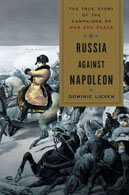 Russia Against Napoleon: The True Story of the Campaigns of “War and Peace”
Russia Against Napoleon: The True Story of the Campaigns of “War and Peace”
By Dominic Lieven. 672 pp.
Viking, 2010
Dominic Lieven, professor of Russian history at the London School of Economics, and author of a book on the Russian Empire and another on Tsar Nicholas II, has written an analysis of Russia’s military, political, and diplomatic actions against Napoleon. The time frame examined begins with the 1807 negotiations at Tilset and extends through 1814.
Lieven does not make a completely convincing case that Russian efforts contributed much more to the destruction of the French Empire than has been claimed by previous Western analysts. But he has provided a fresh description of how Moscow launched and sustained military forces in the West, resulting in the emergence of Russia as a major participant in European geopolitics.
Aspects of this exhaustive work are markedly different from other accounts. Most Western histories of Russia versus Napoleon are almost wholly focused on 1812. Russian military operations during 1813–1814 are usually overlooked. Western authors have also concentrated on Napoleon, his huge army of 1812, and the Russian winter. They have all but dismissed Russian government actions and military operations.
In addition to battle and maneuver, this book explores political and economic factors. Lieven claims most European and American accounts of the subject have portrayed Russian resistance to Napoleon exactly as Leo Tolstoy did in his 1869 novel War and Peace: Ordinary Russians uniting in a passionate and patriotic defense of their native soil. The author says Western scholars have not given proper credit to the government in Moscow and the leadership of the tsar’s army. In fact Lieven describes a functional Russian government and an army that succeeds despite enormous disadvantages.
In short, this book is about a Russian victory—not just the well-worn tale of Napoleon’s failure in 1812. Toward that end, Lieven makes good use of the Russian military archives, which opened in 1991. No other English-language history of this conflict has such an enormous bibliography, much of it reflecting foreign sources, especially Russian. Such extensive research yields a rich account of the Russian logistical and financial support that allowed Moscow to employ military forces in distant lands and achieve strategic goals.
Among the book’s new insights, the author depicts the Russian intelligence apparatus and its penetration of Napoleon’s military and diplomatic security. Lieven asserts that in 1812, the Russians outthought Napoleon. They knew that to win, Napoleon needed a conventional standup, knockdown campaign of maneuver and firepower. Instead they gave the French a “deep retreat” strategy marked by harassment, endless skirmishes, and marches totaling hundreds of miles over bad or nonexistent roads. The Russians burned their own fields and villages to deny resources to the invaders. It all added up to a giant French logistical nightmare, leading to starvation and defeat.
Lieven also describes the evolution of the Russian military. Beginning with the disastrous campaign of 1806–1807, Russia steadily improved training, organization, and leadership. After the devastating battles of 1812, a reconstituted government in Moscow began rebuilding its army. In the campaigns of 1813–1814, the Russians fielded a half million soldiers in Eastern Europe, many of them 600 to 1,000 miles from their training grounds and depots. The Russian government supported this deployment with depots along a lengthy line of communications and through agreements with Prussian and Polish political entities.
These logistical measures involved a complex exchange of wheat and rubles, as well as many local foreign contracts for security, foodstuffs, and fodder. By skillful financial management, the government supported its forces while containing inflation. The author describes the quality of the army Moscow fielded by recounting the mostly positive observations of German and British officers. Finally, Lieven reminds us that the Russian army of 1814 moved into Europe in an unusual role—that of a liberator—freeing its Western neighbors from Napoleon’s oppressive foreign control.
The ultimate defeat of Napoleon and his army was surely at the hands of British and Prussian soldiers. Lieven is a bit too enthusiastic about the overall Russian effect on bringing about Napoleon’s last days in Europe. But, he makes a solid case for the growth of what we would now call Russian “power projection.” By 1814, there was little doubt that Russia had one of the better armies in Europe. And, of more importance, Moscow proved it was quite able to effectively use force (or the credible threat of force) at great distances from its own borders. It had developed a powerful tool of statecraft and gained considerable influence in European geopolitics.
—Rod Paschall





